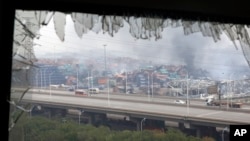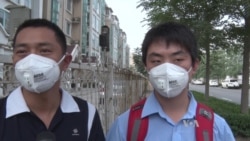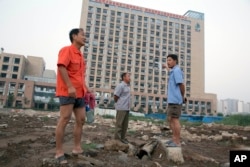Fires are still burning in China’s northern port city, where massive blasts flattened entire city blocks, and for many residents the biggest worry is what is in the smoke plumes drifting over the city.
The government has tried to reassure the public that the air is safe, and that winds carried much of the smoke over the ocean following the blast.
Police Friday also issued statements listing some of the hazardous chemicals, such as ammonium nitrate, a highly combustible chemical used in fertilizer and explosives, that were stored at the site and likely played a role in the explosions.
But on the streets, few people were reassured.
Sitting underneath a willow tree in Tianjin Development Zone's business and residential district, about four kilometers from the blast site, a high school student surnamed Liu and his friends all wore masks.
“I am worried about what is in the air and the possible chemical contaminants,” he said. Liu and his friends spent the morning volunteering at one of the key hospitals helping to hand out water and coordinate the delivery of supplies.
Skeptical residents
Authorities have evacuated thousands from dozens of apartment complexes near where the blasts occurred as most are in need of major repairs. In the Tianjin Development Zone near the blast site, traffic was only half of what it usually is and people stayed indoors or left the city.
Some companies near the blast site had given their employees the day off. But at other areas nearby, two young workers, Wang and another Zhang said they are still waiting for word of what comes next.
“It’s really unclear whether there are any contaminants in the air and there so many stories circulating on social media,” Zhang said. “The less you know the more you worry.”
His friend Wang added that “while the government says this area is safe, we’re just taking precautions just in case.”
WATCH: Skepticism, Worry Follow Tianjin Blasts
On China’s social media, there was rampant speculation over the presence of deadly chemicals such as sodium cyanide. But there have been no public reports that the lingering smoke has led to hospital admittances.
Another high school student surnamed Han, who also had spent his morning volunteering, said his concerns go beyond the information provided on air quality.
“There has not been enough transparency,” Han said. “I think the government is covering things up.” In particular, Han said he did not believe the government’s statistics for the number of dead from the blasts.
Authorities say at least 50 people were killed in the explosions Wednesday night, a number that many had expected would go higher given the size of the explosions and scale of the devastation.
As fire fighters continued to battle the blazes Friday, others were looking for their colleagues who are among the dozens of people reportedly still missing.
Warehouses near residences?
The damage to the many high rise apartment buildings, dormitories and other residences near the port has led many to question why officials allowed the buildings to be constructed there in the first place.
Ye, a college student, said the incident highlights the need for better city planning.
“They put a warehouse with hazardous materials right next to a residential area,” Ye said. The residents have said they were unaware that such hazardous materials were being stored nearby.








